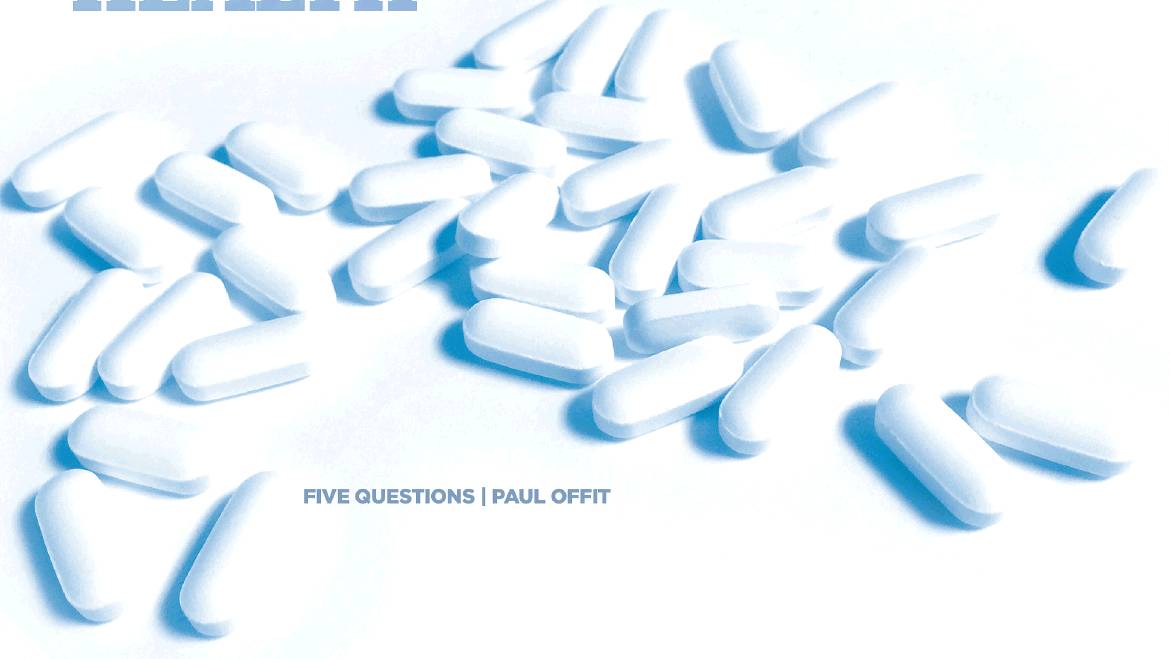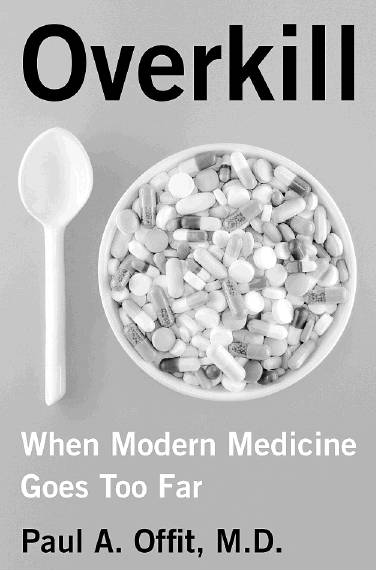FIVE QUESTIONS PAUL OFFIT
Tylenol for fevers, and other myths debunked
By Sandy Bauers FOR THE INQUIRER
By profession, Paul Offit is one of the nation’s foremost vaccine experts.
As director of the Vaccine Education Center at Children’s Hospital of Philadelphia, as well as attending physician in the hospital’s Division of Infectious Diseases, he’s the go-to for information on the safety, and necessity, of vaccines.
By avocation, he’s one of the medical profession’s foremost — and most avid — debunkers.
In nearly a dozen books, he’s taken on alternative medicine (Do you Believe in Magic?), celebrity “experts” (Bad Advice), misguided attempts to cure autism (Autism’s False Prophets), and anti-vaxxers (Deadly Choices).
Now, as if his “and furthermore” file is bulging, he has written a catchall of medical fallacies in Overkill: When Modern Medicine Goes Too Far. In it, he provides the not-so-fast counterpoint to all manner of things many of us take for granted: prostate and breast cancer screening, heart stents, knee replacement surgery, and even whether to ice sprains. (Don’t. The inflammation, while painful, promotes healing.)
We spoke with him recently about some of his more surprising finds.
You say it’s not a good idea to bring a fever down. Whaaat?
Everything that walks, crawls, flies, or swims on the surface of the planet Earth can make fever. Why? Is it to keep pharmaceutical companies in business? Or is it in some way an adaptive part of our immune system?
Look at people who have an infection and treat their fever — or not — and see what happens. What sparked my interest was looking at children who had chicken pox. In one study, half received Tylenol, and half did not. For the children who received Tylenol, their illness lasted longer, and it took longer for their blisters to crust. So while the child did feel better, there was a price to pay.
The explanation is that fever enhances your immune response across the board. The cells that make antibodies work more efficiently at higher temperatures. Similarly, white blood cells also work better at higher temperatures. They kill bacteria better.
Hippocrates thought that fever was our friend. It was there to burn away the bad humors. Although he was wrong about the humors part, he was right about the fever. There are many studies looking at people with a variety of viruses or bacterial infections showing that those treated with fever-reducers have longer illnesses.
We treat fever because that makes us feel better. So it’s understandable. Fever comes with headache, muscle ache, chills. But people wrongly think that when they’ve gotten the fever down, they’re better. Fever is just a symptom, and that symptom is there for a reason. When you treat fever, you are performing an act against Mother Nature.
Physicians have drummed it into us to take a full course of antibiotics so we don’t develop resistant bacteria. Now you’re saying that might not be necessary.
The opposite is true. There are now many studies showing that the longer you treat, the more likely you are to develop bacterial resistance.
Why is it that we assign an arbitrary length of time to treat a bacterial infection? We don’t do that with other illnesses. If you have a kidney infection, we would say to treat for 10 to 14 days with antibiotics. But it may be that within a few days, your back pain is gone, your fever is gone, the bacteria in your urine is gone, and your white cells, your immune system, also have returned to normal levels.
So why continue to treat? People wrongly assumed that if you don’t continue to treat, you’re going to develop resistant strains. Which we now know isn’t true. Or that you’re going to have the infection come back. And that also isn’t true.
Researchers have looked at this. In one study, they compared treatments of 10 to 14 days with seven days, five days, and, in the case of bladder infections, three days. The results consistently show that you can treat for shorter periods of time.
Why give a medicine that you don’t need?
Why not use personalized medicine? Treat the patient. When you have symptoms of any infection, they are caused by your immune response. If you feel better, it’s because your immune response has lessened. Why would it do that? Because the immune system has gotten rid of the infection. So, believe it.
You say sunscreen is not an effective prevention for skin cancer.
Sunscreen is an effective prevention. The problem is that when people put on sunscreen, they think they’re protected. So they tend to stay out much longer, especially from 10 a.m. to 4 p.m., when the sun’s rays are most intense. Also, they tend to not reapply it often enough. It’s not that sunscreen doesn’t work. It’s that it’s not completely protective. People think, “OK, I didn’t get burned. I’m good.” But you can still get skin cancer.
The term we often use, sunblock, is a bad one. If you use a quote-unquote sunblock with an SPF of 50, you have a notion that you’re blocking the harmful rays. You’re not. You’re just dramatically reducing them. If you want to have blockage, stay inside or wear protective clothing.
Why does this misinformation persist, even among medical professionals?
It’s a good question. A few reasons. One is inertia. Physicians have a way of doing things. They’re convinced it works for them. And they’re less likely to change.
Another reason doctors are married to set ways of doing things is financial. When you question the need for prostate screening or thyroid screening programs, neither of which save lives, or when you question the value of heart stents, which don’t change the perception of pain and don’t prolong your life, you’re leaning into the left hook of an industry. People don’t like to have their living messed with.
There is also a strong desire among physicians to make sure their patients are satisfied. Doctors are much more likely to be reviewed favorably by patients who rate them if they provide an antibiotic, even if the patient doesn’t need one. Physicians like to meet expectations.
This book has been brewing in me since medical school. When you’re a medical student, you just want to figure out what you’re supposed to do. You want simple rules. But the two people who were very influential for me in medical school were skeptics. They always said, “Look at the data. Make sure we aren’t doing this just because we always have.”
If even their own physicians don’t have the correct information, what are patients supposed to do?
The purpose of this book is to educate patients so they can ask better questions. If you read the section on ear infections, and you see the evidence showing that one can treat for shorter periods of time, and you see that advisory committees recommend that, it’s reasonable to say to your doctor, “This is what I’ve learned. What do you think?”
The purpose of this book is to empower people to be better wards of their health care, not to be their own doctors. You should trust people with experience and expertise, but at least this gives you some information so you can ask better questions and be a better advocate for your own health.
Bonus question:
What’s next for you?
I think I’d like to write a book titled The Learning Curve.
We are now about to make a vaccine against the novel coronavirus. It is elusive. The disease has a number of effects we couldn’t have imagined — loss of the sense of smell and COVID toes, for instance. The virus has done so many things we couldn’t have anticipated. We are meeting it with every strategy we have, and all at warp speed, which I can’t imagine puts anyone at ease.
I think we are going to learn things in a couple years that we wish we knew now. There will be tragedies. There always are. But people never expect that. They expect to have major breakthroughs without a price. I think we are going to have major breakthroughs, but it will come with a cost because it always does. sandybauers10@gmail.com sbauers


